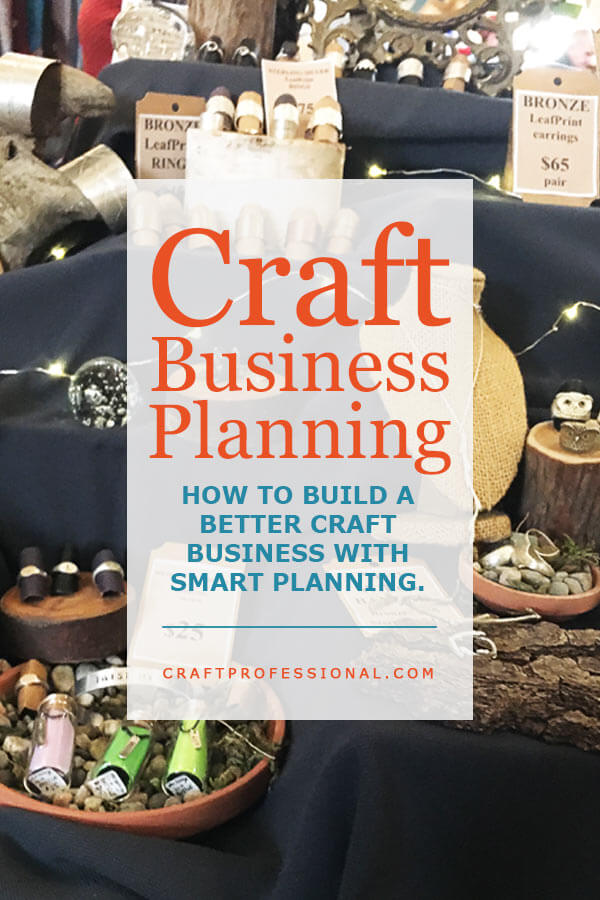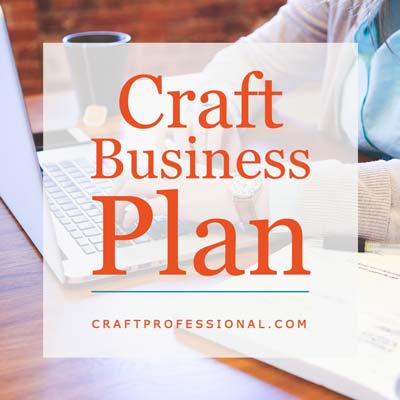How an Art Business Plan Will Help Grow Your Company
Developing an effective art business plan can help you gain focus, predict challenges and opportunities, and create the type of company you desire. Discover how a good plan will help you achieve your goals.
When you launch your creative business, writing a business plan may not be your first priority. However, good planning can help you to determine the direction of your business and the resources you will need to develop your company.

When I first started my business, I was lucky enough to participate in a local business development program, and as part of that program, I was required to develop a business plan.
If I'm being completely honest with myself, I have to admit, I probably would not have developed a business plan if I had not been forced to do so, but I am grateful that I did it.
Working on determining a customer profile, securing business insurance and forecasting cash flow and inventory needs laid an important foundation for my business and forced me to think through details I might not have considered otherwise.
Why People Avoid Creating an Art Business Plan
Often people feel that the main reason for writing a business plan is to secure financing, so by extension, they feel that if they are financing their business with their own money, they don't need a plan.
Others feel that writing the plan takes too much time away from their "real" business activities and is not worth the investment of time.
Writing a good art business plan helps you to get to know your own business on a deep and meaningful level. It carries benefits far beyond securing financing, and while it does take time to write a good plan.
Sometimes you need to slow down to speed up. I believe you'll discover that the time spent writing an effective business plan is well worth the effort.
Benefits of Writing a Good Craft Business Plan
I earn a commission for purchases made through links on this page.
To learn more, please see my disclosure.
You'll determine whether your ideas will work.
Writing a craft business plan forces you to work out all of the details of each aspect of your company. You'll develop a detailed plan for exactly how you will make your business profitable, as opposed to just carrying a vague idea in your mind.
You'll get a sense of the resources you'll need, your costs, the prices you'll need to charge, and whether the business has the potential to become profitable.
You'll set and commit to goals.
You will think through monthly, quarterly and annual goals. Committing your thoughts to paper will help to keep you on track when there's no one but you directing the work that needs to be done.
Committing to goals will also help you to periodically review and assess your targets, determine whether you've met them, analyse why you did or did not meet targets and determine how you will adjust your approach for the future.
You'll investigate the market.
The research required to complete an art business plan helps you to get to know your competition and analyse how you compare with them. You'll assess your competitors' strengths and weaknesses and determine how you will outshine your competition and do a better job of meeting your specific customers' needs.
An art business plan also helps you to estimate typical profits of companies like your own in your own geographic area, so you can set some realistic sales goals for your own company.
You'll anticipate possible problems.
Thinking through your company systematically and writing it all down often uncovers potential issues that you may not otherwise consider until it's too late.
In writing my own initial business plan, I realized that due to the timing of the launch of my business, I would have to wait several months before entering any juried art and craft shows because I had missed the application deadlines for the shows I wanted to enter.
This realization helped me to focus on developing other sales venues and let me take advantage of the significant lead time before entering juried shows so I could be very well prepared for my first shows.
When you are aware that certain problems may arise before they happen, you will be better prepared to avoid them, deal with them, work around them or even turn them into advantages.
You'll develop a marketing strategy.
You'll determine your target market and plan ways to reach them based on their own unique characteristics. Of course you'll make adjustments along the way, but starting with a well thought out plan in mind is far more effective than random, unplanned marketing.
You'll assess your financial needs.
It's amazing how quickly expenses add up. There's business insurance, travel costs, bookkeeping and accounting, wholesalers' minimum purchase requirements, bank fees, membership fees, industry publications, and a long list of other expenses you may not consider unless you carefully think through all of your expenses.
The only way to get a good sense of your expenses and cash flow needs is to forecast and write them down.
When I first started doing juried art shows, I was grateful to have a good financial tracking system in place. Preparing for juried art shows can require a big financial outlay, which can be a bit surprising when you are new to selling at art shows.
Your booth fee is normally due a few months before the actual show, and you'll need to invest money to buy supplies to create enough inventory for a juried art show.
All of this money will come out of your business bank account well before you see any profit from the show, so good financial planning and forecasting is essential. A good business plan will help you put that financial plan in place.
You'll be positioned to attract investors and/or secure loans.
Many professional craft artists typically start working out of the home and invest their own personal money in the business, so attracting investors may not be a factor for your business. However, if you do hope to attract investors, or secure a business loan, a business plan is absolutely required.
Writing Your Art Business Plan
I have read several books about writing business plans, and my absolute favorite is Successful Business Plan by Rhonda Abrams. If I could only buy one book on writing a business plan, this is the one I'd buy.
Successful Business Plan: Secrets & Strategies is extremely thorough. You'll need to work through the book step by step, and don't allow yourself to be overwhelmed by the sheer amount of information in the book. Simply focus on one section at a time, and it will take you through the process of writing an effective craft business plan that meets your specific needs.





New! Comments
Have your say about what you just read! Leave me a comment in the box below.